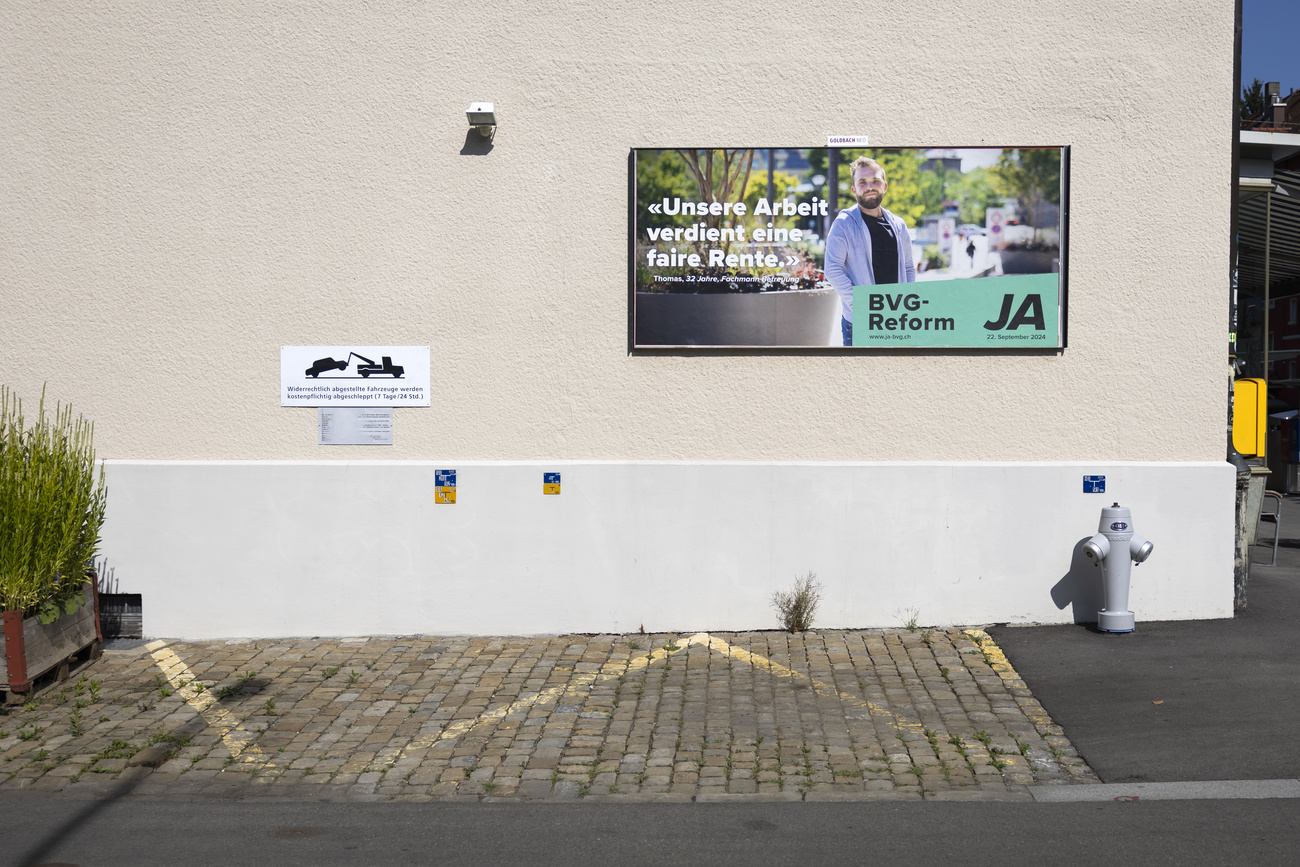
Six lessons from Swiss voters’ rejection of occupational pension reform

To convince voters of a change to the pension system, it must be made very clear to them how their wallets will be hit. This is one of six takeaways from Sunday’s clear “no” to the proposed makeover of the second pillar.
1 The proposal was not transparent
Anyone who wanted to know exactly how the proposed reform of the occupational pension scheme would affect their retirement income looked in vain. Google was unable to provide a good answer to the trending search term “occupational pension reform calculator”; even Interior Minister Elisabeth Baume-Schneider advised voters to “ask [their] pension fund”.
What was more or less clear was that the change would not affect current pensioners, and that little would change for Swiss living abroad – except if they still had a Swiss employment contract, vested benefits in an account, or plans to return to Switzerland. This multitude of scenarios just for the Swiss Abroad showed how many ways the reform could lead. The fact that the proposal was inherently complex couldn’t be changed and was only the second biggest weakness of the bill – the biggest was its lack of transparency.
2 Pension reform can only move in baby steps
Government and parliament have learned nothing. In 2017, when the last major attempt at a pension reform failed, it seemed as if authorities had at least grasped the fact that only incremental steps were possible in the sensitive area of pension reform.
Proof of this came five years later with a successful bid to raise the retirement age for women to 65. To get this reform through, the complexity of the issue was reduced and the group of potential losers from the change was minimised. This latter step was key, given that such proposals have often been hampered by the number of people who can see themselves as “victims”; when it comes to pensions, voters don’t make decisions based on the stability of the system, but on the size of their own pensions.
As regards Sunday’s vote, government and parliament should thus have opted to present a separate proposal to improve the pension situation for part-time workers and low earners (via the coordination deduction). Instead, they tried to make this element, which all sides agreed on, the foundation of a more comprehensive reform of the second pillar – with the result that this blatant flaw in the pension scheme now continues to exist.
3 Trade Union boss Pierre-Yves Maillard cements his power
It’s another victory for the man who is probably the most influential politician in Switzerland right now. In March, the head of the Swiss Trade Union Federation played a key role in a vote to boost payments in the first pillar of the pension system. Now he has spearheaded the scuppering of a reform to the second pillar.
Maillard has thus cemented his status as the voice of the Swiss people – a left-wing populist who has stepped into the shoes of 83-year-old right-wing populist Christoph Blocher. As different as the two are politically, they share a unique sensitivity for the concerns of the population and the ability to win over voters with easy-to-understand slogans.
“Pay in more and get less pension” was Maillard’s winning slogan this time around. Although that claim only applied to a fraction of the population, 55% of respondents in surveys shared the view of the reform as a “rip-off” for workers.

4 Economic actors are out of touch with the population
The business community and centre-right parties are finding it increasingly hard to win people over to their cause. The employers’ association, the business federation economiesuisse and centre-right parties were already licking their wounds after the vote for a 13th pension payment earlier this year. Now they’ve suffered another defeat. What works in the right-leaning parliament fails when put to the people.
Arguments by the business community find neither echo nor acceptance among the wider public. Discussions about executive salaries and corporate responsibility, the rescue of UBS, the shipwreck of Credit Suisse – this has all resulted in a loss of trust, at the same time as daily life has become noticeably pricier for many. This has had an effect. Not only do left-wing organisations now have far more influence on channels such as Instagram and Tiktok; the economic community is also increasingly lacking a face – a figurehead who carries weight, commands credibility, and radiates passion.
Not even politicians are keen to head into battle anymore: parties in favour of the pension reform outsourced the “yes” campaign to a professional organisation. But while signature collecting can be handed to specialised companies and people’s initiatives bought, popular votes can’t be won so easily. Victories at the ballot box require fire and passion – which was sorely lacking this time.
5 Trust in institutions has been shaken
Trust in government is higher in Switzerland than in any other OECD country and is often seen as a factor in the success of the Swiss model. But it is a fragile asset.
The announcement in summer of an error in the calculation of first-pillar pension projections – expenditure for 2033 would in fact be several billion francs lower than previously presented – has brought the Federal Social Insurance Office, and more generally the entire federal administration, into disrepute.
At a time when it is becoming increasingly difficult to distinguish true from false, this error could have long-term negative repercussions on the bond of trust between the Swiss and their authorities, politicians worry. And even if it is difficult to measure, the miscalculation affair undoubtedly weighed on the clear “no” vote on Sunday. On the one hand, the error revealed that the pension system is in better shape than expected. On the other hand, the sense of trust which sometimes manages to push complex official projects past voters was tarnished.
In this climate, the rational arguments which could have been advanced in favour of a reform of the occupational pension scheme, including from the left – such as better pension coverage for low-paid workers, particularly women – were simply not heard and were drowned out by the extreme complexity of the project.
6 The sense of urgency was not there
Swiss pension funds are in good health; even during the campaign, nobody ventured to say otherwise. Fears of poor yields on their investments, advanced as the main reason for lowering the conversion rate and therefore pensions, have not materialised.
Pension funds have rather been able to boost their coverage ratio in recent years. In the first quarter of 2024, this indicator – which measures the ratio between a fund’s assets and its liabilities to active employees and pensioners – stood at 119.6%, according to the Swiss Cantonal Banks Monitor (Swisscanto). This is well above the 100% mark required for pension funds to cover their liabilities.
The ageing population and longer life expectancy also do not appear to be imminent threats. With its strong demographic growth, mainly due to the arrival of labour from European countries, Switzerland is in an enviable position in terms of the ratio between working population and pensioners.
With the clear “no” on Sunday, Swiss voters evidently judged that the pension system did not need to be put on life support – the patient is in good health.
Edited by Mark Livingston; translated from German/French by DeepL/dos
Subscribe to our special newsletter to get all the latest information you need on Swiss popular votes.

In compliance with the JTI standards
More: SWI swissinfo.ch certified by the Journalism Trust Initiative

























You can find an overview of ongoing debates with our journalists here . Please join us!
If you want to start a conversation about a topic raised in this article or want to report factual errors, email us at english@swissinfo.ch.